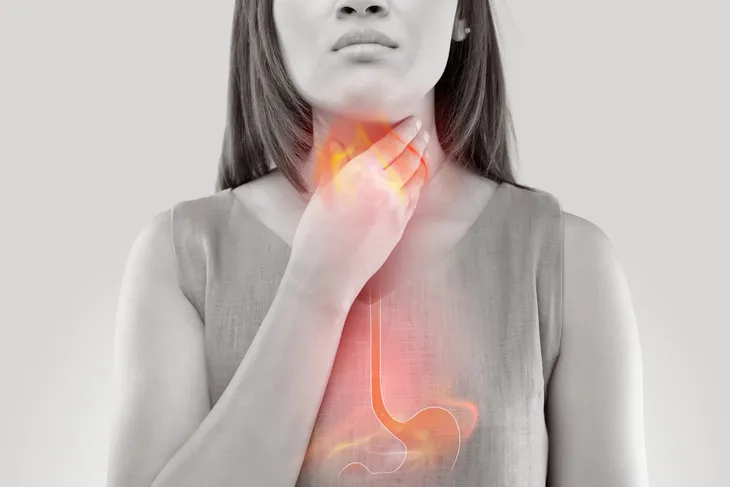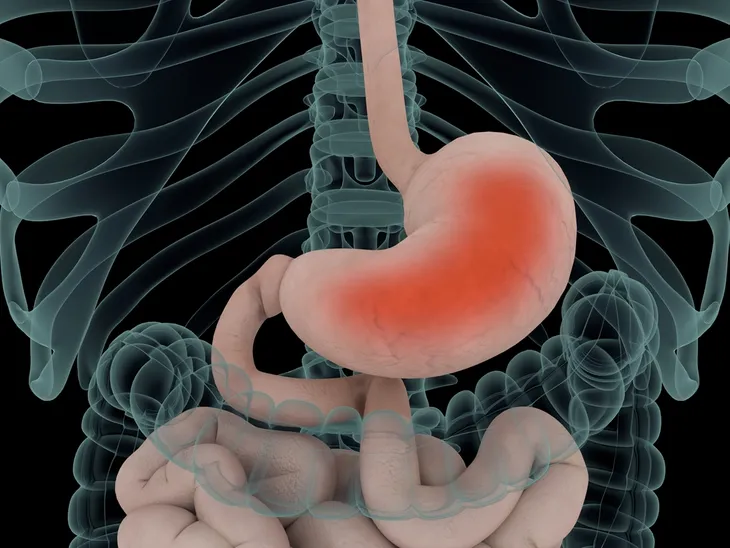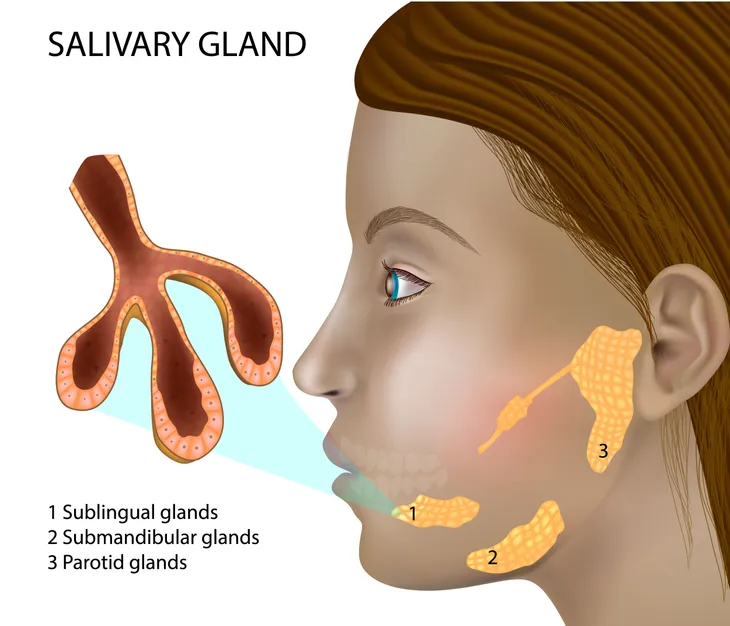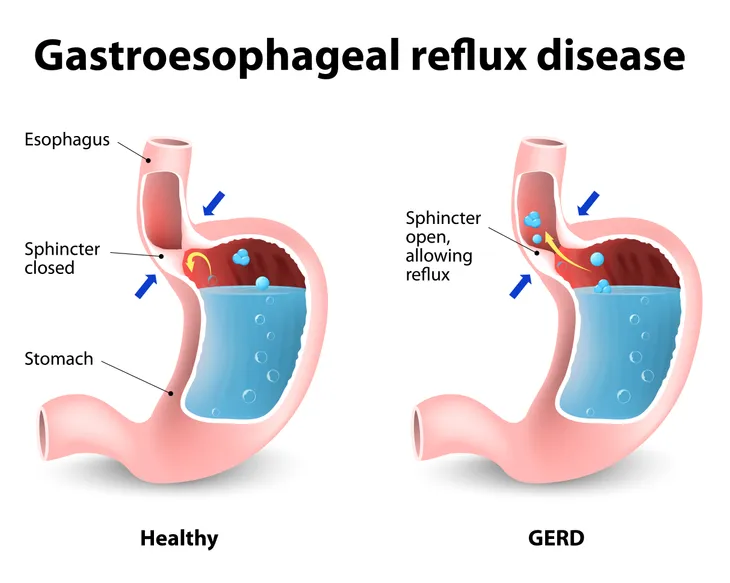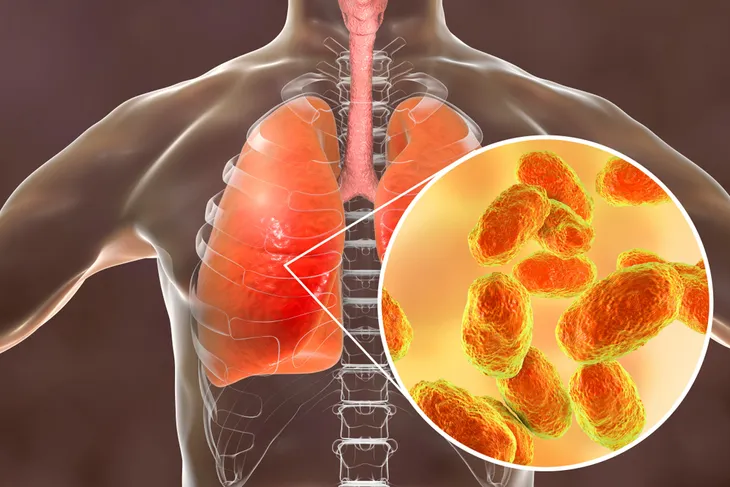Gastroesophageal reflux disease, also known as GERD, is a common digestive disorder that affects the lower esophageal sphincter (LES), the ring of muscle that lies between the esophagus and the stomach. The most common symptoms of GERD are heartburn or acid indigestion, but there are others. Here are the 15 most common symptoms of GERD…
1. Dyspepsia
Dyspepsia, more commonly known as indigestion, causes mild to severe stomach pain, most typically following meals. “Reflux can cause a narrowing of the throat due to damage and scarring, so food is actually being held up on its way down,” says Josh Murray, MD, to Prevention. This can be extremely uncomfortable. Prevention describes it as “feeling like your food has grown claws and is raking at your throat as it heads toward your stomach.” Ouch!
2. Sore Throat
We usually associate sore throats with being sick, but GERD can also irritate the throat and airways if stomach acids flow upward. Unlike a sickness, this sore throat won’t just go away in time. GERD sufferers have a chronic sore throat. Not only will they have a sore throat, but also the sensation of a constant lump in the throat that won’t clear. As a result, GERD patients may constantly clear their throats.
3. Chronic Dry Cough
Those with GERD typically suffer from an unexplained and constant cough, particularly at night or why lying prone. Health.com writes, “Many respiratory symptoms, such as chronic cough and wheezing, can also be due to heartburn, likely because stomach acid is getting into your lungs.” The source also warns patients to request a pH test from their doctor if they have a suspicion that heartburn is the culprit behind any of their symptoms, including a chronic cough.
4. Hoarse Voice
Don’t just equate a hoarse voice with sickness, there could be more to it. If acidic juices regularly flow up into the upper esophagus, it can affect the throat and even the voice box (or the larynx), which eventually results in a hoarse voice and sore throat. Timothy Pfanner, MD, assistant professor of Internal Medicine at Texas A&M Health Science Center College of Medicine, in College Station, told Health.com that stomach acid in the esophagus can damage the vocal chords. If you notice a change in your voice after eating then you could be suffering from GERD.
5. Breathing Issues
Refluxed acid can cause breathing issues and even asthma in severe cases if it enters the airways. The reality is that most asthma medications actually worsen acid reflux.
6. Regurgitation
GERD typically causes nausea. However, if it persists for long periods of time, causing excessive acid reflux, regurgitation and vomiting can occur. According to WebMD, “Many people say it feels like food is coming back into the mouth leaving an acid or bitter taste,” which would explain why many people who suffer from GERD also feel nauseous.
7. Excessive Salivation
Many GERD sufferers experience increased saliva because of trouble swallowing or keep saliva in the mouth. According to Prevention who spoke with Josh Murray, MD, a full mouth of saliva after a meal is one of the best indicators of GERD. Sometimes, we forget just how in sync our body is. If the body senses an irritation in the esophagus, it tells the salivary glands to start working overtime, which is why people with acid reflux will experience an unusual amount of salvation.
8. Bad Breath
Foul breath is one of the more embarrassing symptoms of acid reflux. The bad breath is caused by acid flowing up from the stomach and digestive system into the oral cavity.
9. Chest Pain
For many people, the first thing we associate chest pain with is a heart attack, but chest pain can also be a very common symptom of GERD. Chest pain strikes GERD sufferers when stomach acid splashes back up into the esophagus, causing very intense pain that can often be mistaken for a heart attack. “It’s not uncommon to see someone in the ER with terrible chest pain, thinking it’s a heart attack, when it’s actually reflux,” says Josh Murray, MD, to Prevention. Unfortunately, there are many instances where the opposite happens. Someone is experiencing chest pain, but instead of going to the ER, they chalk it up to a minor ailment such as GERD. “When in doubt, go to the emergency room,” says Murray.
10. A Failure to Thrive
Although GERD is not a life-threatening condition, it can significantly affect your quality of life if symptoms, such as heartburn, chest pain, sore throat, and nausea, cause pain, embarrassment, and depression. Nighttime reflux can also cause insomnia, whereas the stress surrounding reflux-triggering foods can be very overwhelming.
11. Heartburn
WebMD lists heartburn as one of the most common symptoms of GERD and says it “usually feels like a burning chest pain beginning behind the breastbone and moving upward to the neck and throat.” It goes on to share that many people have reported that it feels like food is coming back up into their throat and leaving a bad or bitter taste in their mouth.
For many people, the pain of heartburn is no joke and it can last for up to two hours! Not surprisingly, it tends to get worse after eating. It usually begins once a person lays down or even just bends over. The best way to find relief is to stand upright or take an antacid to clear out the acid.
12. Asthma
As if suffering from GERD wasn’t uncomfortable enough, among the many symptoms that accompany GERD, is asthma. “When you lie down, acid washing up into the esophagus can trigger a reflex that causes wheezing,” says Josh Murray, MD, a GI doctor and researcher at the Mayo Clinic, to Prevention. “The acid can also go into airways and cause direct irritation, so you could be waking up choking and coughing.”
Health.com says it’s unclear how often GERD leads people to develop asthma, but that many people who suffer from GERD also have asthma. Whether there is a link between the two is still not clear.
13. Bitter Taste
Not surprisingly, when stomach acid washes back up into the throat and the back of the mouth, it can leave a bitter or sour taste in your mouth. This symptom goes hand in hand with bad breath, which was previously mentioned. A 1999 study published in The American Journal of Medicine lists acid regurgitation as one of the best signs used to diagnose GERD and that “acid regurgitation was defined as a bitter or sour-tasting fluid coming into the throat or mouth.”
As previously mentioned, in severe cases of GERD, this acid regurgitation can cause choking, especially if it happens while the patient is asleep. “I’m very aggressive with therapy if patients wake up choking,” says Walter J. Coyle, MD,a GI doctor with Scripps Clinic Torrey Pines in La Jolla, California to Health.com. To find relief, he says he will prescribe acid-suppressing medication such as “proton pump inhibitors, H2 blockers, and antacids.”
14. Pain After Eating and While Resting
One of the hardest things about GERD is finding relief. It’s one of the few conditions that actually gets worse when you try to rest and lie down! This is because a horizontal position (or bending over) is when the acid is most likely to escape into the esophagus. “If you’re sitting up straight, gravity helps keep food in the stomach. If you lose the gravity, you’re more prone to reflux,” says Dr. Coyle to Health.com.
The fact that symptoms occur right after eating isn’t all that surprising, especially if it’s a big meal. When a stomach is stuffed, the easiest place for any excess food to go is up! People who suffer from GERD should steer clear of fast food, alcohol, or anything too fatty. “I would stress not eating big, fatty meals and watching [your intake of alcohol and tobacco],” says Coyle.
15. Pneumonia
This might seem like an odd symptom for acid reflux, but there’s an explanation behind it! Stomach acid isn’t meant to leave the stomach, so when it does, it causes all kinds of problems. Not only does it irritate the throat but also the stomach acid can travel into the lungs. Joseph Murray, MD, told Prevention that if this were to happen, it’ll most likely cause a nasty case of pneumonia. Acid reflux could also be the culprit behind multiple unexplained cases of pneumonia in the past.

